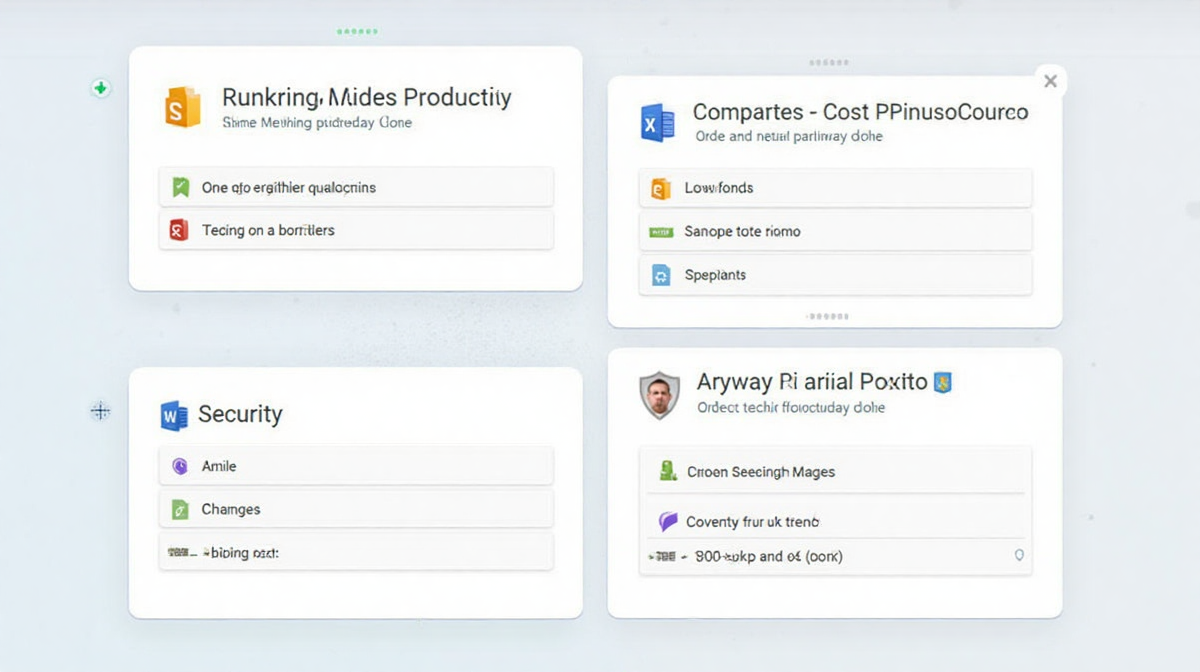Top 5 Lotus 365 Alternatives (2024)
The Decline of Lotus 365 & The Need for Alternatives
Lotus 365, once a popular choice for office productivity, is facing a decline in usage and support. This necessitates exploring viable alternatives for individuals and businesses who rely on such tools. Transitioning away from a discontinued platform ensures continued access to essential functionalities and ongoing updates. Many users are actively searching for options beyond lotus 365 .online and looking for alternatives that offer modern features and reliable support.
What to Look for in a Lotus 365 Replacement (Key Features)
When seeking a replacement for Lotus 365, several key features should be considered. Collaboration is paramount in today’s workplace, demanding seamless document sharing and co-editing capabilities. Cost is also crucial, with options ranging from free open-source solutions to subscription-based services. Security, particularly data privacy, is non-negotiable, requiring robust measures to protect sensitive information. A smooth transition requires compatibility with existing files and workflows. Many are discovering the excitement of trying the best aviator game site in india while searching for new productivity tools!
Briefly Introducing the Top 5 Alternatives
This article will provide an in-depth comparison of five leading alternatives to Lotus 365: Microsoft 365, Google Workspace, Zoho Workplace, LibreOffice, and ONLYOFFICE Workspace. Each option offers unique strengths and weaknesses, catering to different needs and budgets. Some users also find entertainment in a free aviator game during downtime while researching these options.
Microsoft 365 (Formerly Office 365)
A Familiar & Comprehensive Suite
Microsoft 365 remains the industry standard for office productivity, offering a comprehensive suite of applications known to professionals worldwide.
Core Applications: Word, Excel, PowerPoint, Outlook, Teams
The core of Microsoft 365 is built around well-established applications: Word for document creation, Excel for spreadsheets, PowerPoint for presentations, Outlook for email and calendar management, and Teams for collaboration and communication.
Pros: Integration, Scalability, Industry Standard
Its seamless integration between applications is a significant advantage. Microsoft 365 is highly scalable, adapting to the needs of both individuals and large enterprises. Its widespread adoption makes it an industry standard, ensuring compatibility and ease of collaboration with others. Looking for something different? Lotus 365 vip login might lead you to explore these alternatives!
Cons: Cost, Complexity, Privacy Concerns
The subscription cost can be prohibitive for some users. The extensive feature set can also be overwhelming, leading to a steeper learning curve. Data privacy remains a concern for some customers, especially regarding Microsoft’s data collection practices.
Who is Microsoft 365 best for?
Microsoft 365 is ideally suited for enterprise solutions requiring robust features, industry-standard compatibility, and advanced security options.
Pricing & Plans Overview
Microsoft 365 offers various plans with different features and price points, ranging from personal subscriptions to business plans with advanced administration tools.
Google Workspace
Cloud-Native Collaboration Powerhouse
Google Workspace is a cloud-native suite designed for real-time collaboration and accessibility.
Core Applications: Docs, Sheets, Slides, Gmail, Meet, Drive
The suite includes Docs for word processing, Sheets for spreadsheets, Slides for presentations, Gmail for email, Meet for video conferencing, and Drive for cloud storage.
Pros: Real-Time Collaboration, Accessibility, Cost-Effective
Google Workspace excels in real-time collaboration, enabling multiple users to work on the same document simultaneously. Being cloud-based, it offers excellent accessibility from any device with an internet connection. It is also generally more cost-effective than Microsoft 365.
Cons: Reliance on Internet Connectivity, Feature Limitations Compared to Desktop Versions
A stable internet connection is essential for optimal performance. Some users may find the feature set limited compared to the desktop versions of Microsoft Office applications. Offline Access can be a concern.
Who is Google Workspace best for?
Google Workspace is an excellent choice for small businesses, education, and anyone prioritizing collaboration and accessibility.
Pricing & Plans Overview
Google Workspace offers a range of plans tailored to different business sizes, with competitive pricing and storage options.
Zoho Workplace
All-in-One Business Suite with Integrated Apps
Zoho Workplace provides an all-in-one business suite, integrating office applications with other business tools like CRM and project management.
Core Applications: Writer, Sheet, Show, Mail, Cliq, WorkDrive
The suite includes Zoho Writer, Sheet, and Show for document, spreadsheet, and presentation creation, Zoho Mail for email, Zoho Cliq for team communication, and Zoho WorkDrive for cloud storage.
Pros: Affordability, Integrated CRM & Business Apps, Customization
Zoho Workplace stands out for its affordability and integration with Zoho’s broader suite of business applications. It offers extensive customization options to adapt to specific workflows.
Cons: Steeper Learning Curve for Some, Integration Challenges with Non-Zoho Apps
Some users may experience a steeper learning curve due to the breadth of features. Integration with non-Zoho applications can be challenging. Consider your current systems for seamless Integration with Existing Systems.
Who is Zoho Workplace best for?
Zoho Workplace is best suited for startups and SMEs seeking an affordable and integrated business solution.
Pricing & Plans Overview
Zoho Workplace offers flexible pricing plans, including free options and paid plans with advanced features and support.
LibreOffice
The Powerful & Free Open-Source Option
LibreOffice is a powerful and free open-source office suite.
Core Applications: Writer, Calc, Impress, Draw, Base, Math
The suite includes Writer for word processing, Calc for spreadsheets, Impress for presentations, Draw for vector graphics, Base for database management, and Math for mathematical formulas.
Pros: Completely Free, Feature-Rich, Cross-Platform Compatibility
LibreOffice is entirely free to use and offers a comprehensive feature set comparable to commercial office suites. It boasts excellent cross-platform compatibility.
Cons: Outdated Interface, Compatibility Issues with Complex Documents, Limited Cloud Collaboration
The user interface can feel outdated compared to modern office suites. Compatibility issues may arise with complex documents created in other applications. Cloud collaboration features are limited. File Compatibility requires testing.
Who is LibreOffice best for?
LibreOffice is an excellent choice for budget-conscious users, individuals, and organizations prioritizing open-source software.
Installation & Usage Overview
LibreOffice is available for download on various operating systems and is relatively easy to install and use.
ONLYOFFICE Workspace
Open-Source, Collaborative Office Suite with Strong Compatibility
ONLYOFFICE Workspace is an open-source collaborative office suite with a strong focus on Microsoft Office compatibility.
Core Applications: Document Editor, Spreadsheet Editor, Presentation Editor
The suite includes a powerful Document Editor, Spreadsheet Editor, and Presentation Editor.
Pros: Excellent Microsoft Office Compatibility, Collaborative Editing, Self-Hosting Option
ONLYOFFICE excels in compatibility with Microsoft Office formats. It offers real-time collaborative editing features and a self-hosting option for enhanced data control.
Cons: Limited Features Compared to Microsoft 365/Google Workspace, Requires Technical Expertise for Self-Hosting
The feature set is not as extensive as Microsoft 365 or Google Workspace. Self-hosting requires technical expertise. Prioritizing Data Control is key to selecting this option.
Who is ONLYOFFICE best for?
ONLYOFFICE is best suited for organizations prioritizing data control, Microsoft Office compatibility, and collaborative editing.
Pricing & Plans Overview
ONLYOFFICE offers both cloud-based and self-hosted options with various pricing plans.

Comparison Table: Lotus 365 Alternatives
Feature-by-Feature Comparison
| Feature | Microsoft 365 | Google Workspace | Zoho Workplace | LibreOffice | ONLYOFFICE |
|---|---|---|---|---|---|
| Collaboration | Excellent | Excellent | Good | Limited | Excellent |
| Cost | High | Moderate | Low | Free | Moderate |
| Security | Robust | Good | Good | Basic | Good (Self-Hosted) |
| File Compatibility | Excellent | Good | Good | Good | Excellent |
| Ease of Use | Moderate | Easy | Moderate | Moderate | Moderate |
(This is a simplified Feature Comparison Chart. A detailed comparison would involve many factors.)

Conclusion
Choosing the Right Alternative: Recap & Recommendations
Selecting the right Lotus 365 alternative depends on individual or organizational needs. Microsoft 365 offers the most comprehensive feature set, but comes at a premium price. Google Workspace excels in collaboration and accessibility. Zoho Workplace provides an affordable and integrated business solution. LibreOffice is a great free option for basic office tasks. ONLYOFFICE prioritizes compatibility and self-hosting. Finding the Best Office Suite 2024 depends on your specific requirements.
Final Thoughts on Migrating from Lotus 365
Transitioning from Lotus 365 requires careful planning and consideration. Evaluate your specific needs, budget, and technical capabilities before making a decision. Ensure a smooth migration process by backing up your data and testing compatibility with your existing systems. With the right choice, you can maintain productivity and collaboration without being held back by discontinued software.


